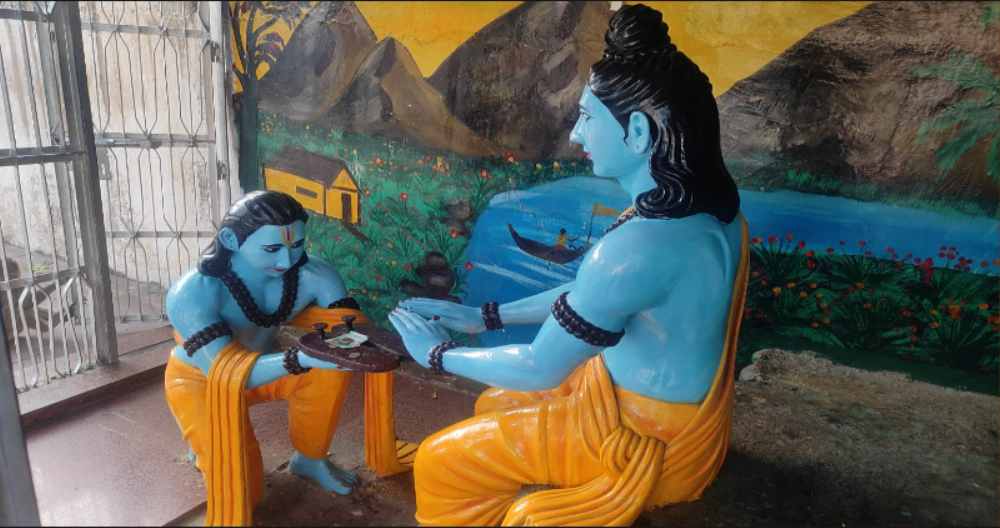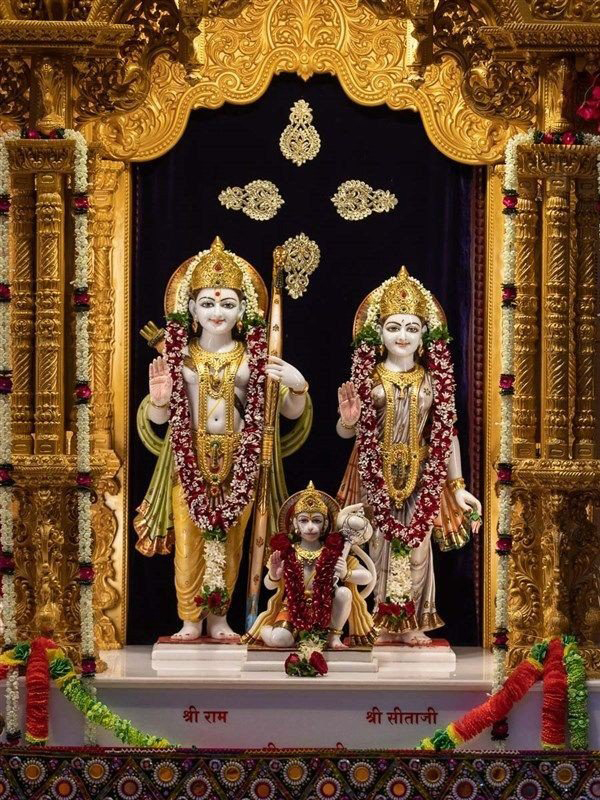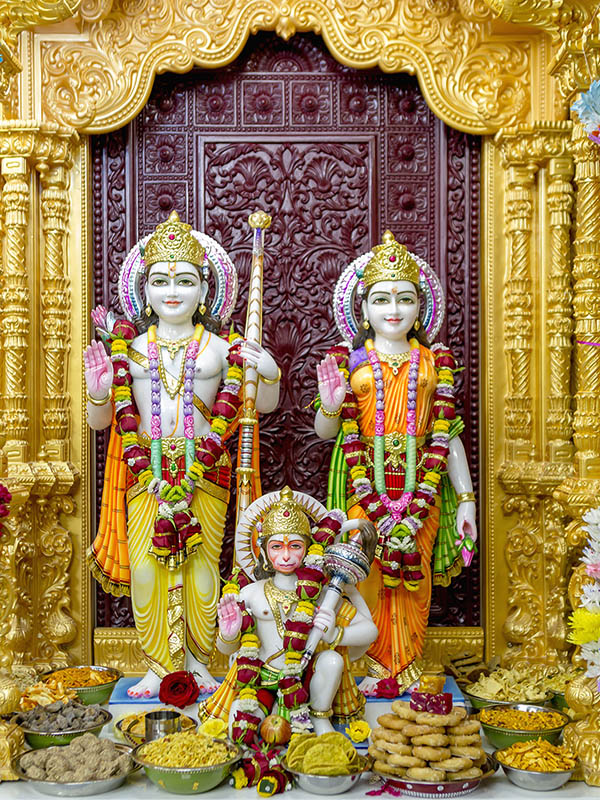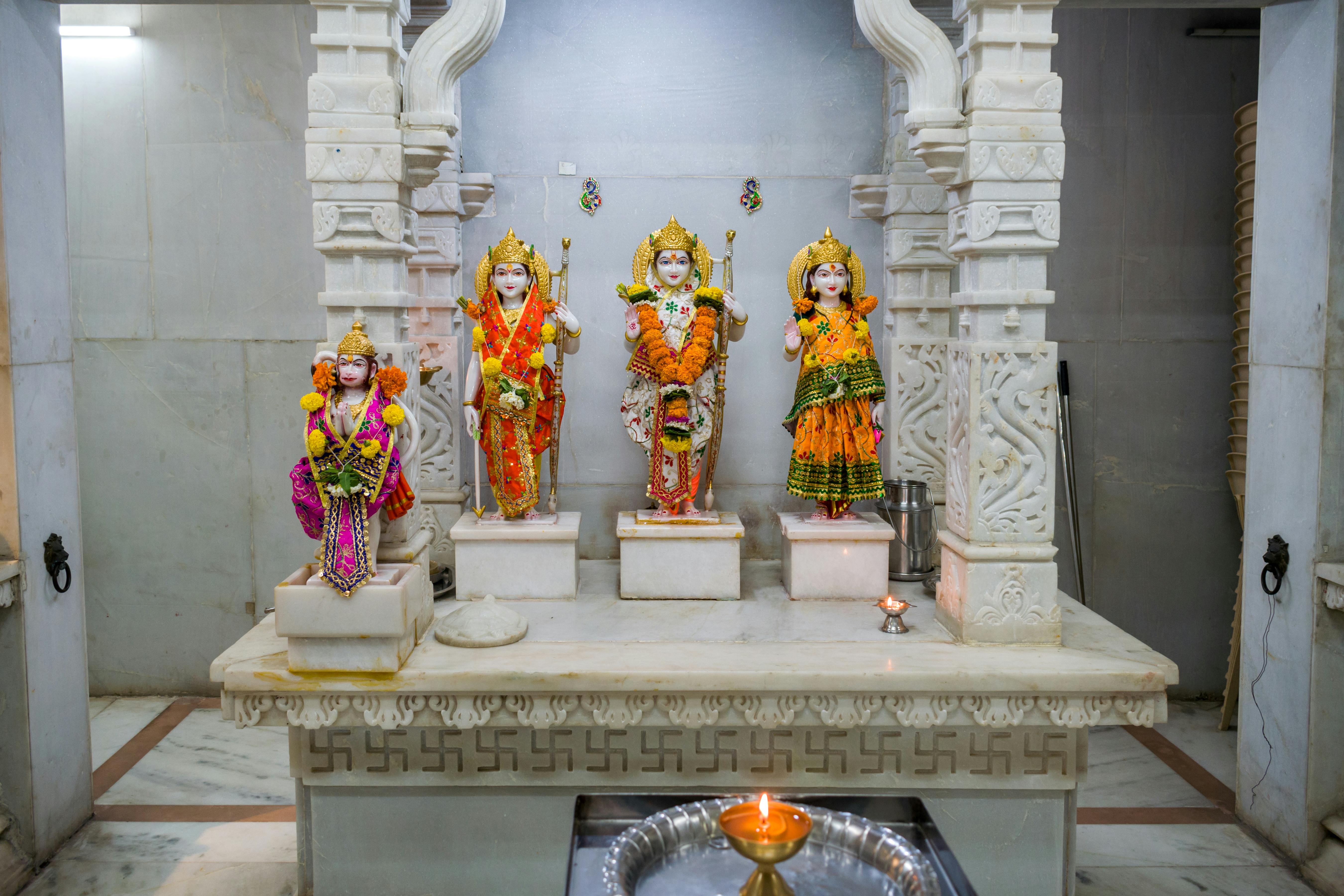In the sacred forest of Chitrakoot, two gatherings filled with Shri Ram’s love met.
The people of Ayodhya traveled a long way, motivated by their love for the prince who was in exile. The royal court of Mithila came, led by the wise King Janak. Sages, ministers, mothers, and many devotees gathered, all drawn together by a strong bond of devotion to witness one of the most touching moments in the Ramayana epic.
निरखि बिबेक बिलोचनन्हि सिथिल सनेहँ समाजु। करि प्रनामु बोले भरतु सुमिरि सीय रघुराजु॥
“With wise eyes, Bharat observed the gathering filled with love. He bowed to everyone and remembered Sita and Raghunath.
Bharat stood up, his body shaking like a leaf in the breeze. Tears flowed down his cheeks as he looked at his dear elder brother Ram, who sat in simple bark clothing, exuding a peace that was greater than any earthly kingdom.
प्रभु पितु मातु सुहृद गुर स्वामी। पूज्य परम हित अंतरजामी॥ सरल सुसाहिबु सील निधानू। प्रनतपाल सर्बग्य सुजानू॥
O Lord, You are my father, mother, friend, guru, master, revered one, the ultimate well-wisher, and the knower of every heart. You are humble by nature, a true master, a treasure of virtue, protector of the meek, all-knowing, and wise…
Bharat’s voice trembled with feeling. The crowd was spellbound, witnessing devotion in its most genuine form. O Merciful One, Bharat went on, blinded by my attachments, I ignored Your command and our father’s desire. I gathered this whole assembly here. Yet, even in my boldness and disobedience, You have accepted my actions as a gesture of love.
कृपाँ भलाईं आपनी नाथ कीन्ह भल मोर। दूषन भे भूषन सरिस सुजसु चारु चहुँ ओर॥
Through Your kindness and grace, my Lord, You have granted me goodness. My flaws have become strengths, and my humble name now shines with respect everywhere.
Ram listened, his lotus-like eyes shining. Lakshman stood close by, his heart filled with emotion. Sita, inside the hut, sensed the waves of this divine love. Even the birds stopped singing, the wind held its breath, and all of nature paused to observe this holy moment.
Bharat clasped his hands, pressing them against his heart.
प्रभु पद पदुम पराग दोहाई। सत्य सुकृत सुख सीवँ सुहाई॥ सो करि कहउँ हिए अपने की। रुचि जागत सोवत सपने की॥
O Lord, grant me the dust of Your lotus feet, the pinnacle of truth, virtue, and joy. With this, I express the deep yearning that resides within me, whether I am awake, asleep, or dreaming…
The assembly leaned in closer. What would this devoted prince request? “My sole desire,” Bharat proclaimed, his voice gaining strength, “is to serve You with genuine, untainted love, casting aside deceit, selfishness, and even the four pursuits of life. Among all acts of service, none surpasses obedience to the Master’s command.”
अस कहि प्रेम बिबस भए भारी। पुलक सरीर बिलोचन बारी॥ प्रभु पद कमल गहे अकुलाई। समउ सनेहु न सो कहि जाई॥
Thus speaking, love overwhelmed him profoundly. His body trembled with emotion, tears welled in his eyes, and in deep sorrow, he grasped the lotus feet of Shri Ram. The love of that moment transcended words.
Ram, the ocean of compassion, could no longer restrain himself. He gently lifted Bharat, holding his hand, and seated him close. The entire assembly, sages, kings, and common people alike, felt their hearts melt in the sweetness of this connection.
King Janak, known for his detachment, found tears streaming down his face. Guru Vashishth, the personification of wisdom, sat in silence. Even the demigods in heaven showered flowers, their hearts touched by this earthly manifestation of divine love.
Ram spoke, his voice flowing like sweet nectar.
तात तुम्हारि मोरि परिजन की। चिंता गुरहि नृपहि घर बन की॥ माथे पर गुर मुनि मिथिलेसू। हमहि तुम्हहि सपनेहूँ न कलेसू॥
“O Brother, Guru Vashishth and King Janak look after us and our family equally, whether we are at home or in the forest. As long as they are our protectors, neither you nor I need to carry any worries, not even in our dreams.”
Ram articulated the path of dharma with such clarity that each word seemed to shine a light on the soul
Ram articulated the principles of dharma with such brilliance that each word seemed to light up the spirit-
“For both of us, the greatest righteousness is in obeying our father’s command. By upholding his vow, all virtue will be granted to him, and his glory shall resonate in the Vedas and across the world.”
गुर पितु मातु स्वामि सिख पालें। चलेहुँ कुमग पग परहिं न खालें॥
“By following the advice of one’s guru, father, mother, and master, even if a person walks a difficult road, they shall never stumble into a pit.”
Ram’s words were like a bridge across the ocean of confusion, showing the way forward with perfect wisdom and compassion.
Bharat was all ears, soaking in every word. Still, his heart ached for something real, a connection that would help him endure the long years of separation.
“O Lord,” he murmured, “I have brought sacred waters from all the holy pilgrimages for Your coronation. What will happen to them now? And…” his voice quivered, “may I once again visit these forests, to behold the places blessed by Your feet?”
Ram beamed with infinite kindness. “Certainly, with Sage Atri’s consent, you may roam the forest freely. Wherever the great sage leads you, offer those sacred waters there.”
Yet Shri Ram saw beyond the surface. He grasped the unvoiced request in His brother’s eyes.
भरत सील गुर सचिव समाजू। सकुच सनेह बिबस रघुराजू॥ प्रभु करि कृपा पाँवरीं दीन्हीं। सादर भरत सीस धरि लीन्हीं॥
“Raghuveer found Himself at a crossroads, on one side was His deep affection for Bharat’s humility, and on the other was the presence of His Guru and the entire assembly.
In the end, compassion won out, and the Lord entrusted His wooden sandals to Bharat, who, with the utmost reverence, lifted them and placed them upon his head.”
The moment was charged with energy. As Bharat accepted those humble wooden sandals, his expression changed entirely. The sorrow dissipated, replaced by a glow of pure joy, as if Ram Himself had consented to return to Ayodhya.
चरनपीठ करुनानिधान के। जनु जुग जामिक प्रजा प्रान के॥ संपुट भरत सनेह रतन के। आखर जुग जनु जीव जतन के॥
“The two sandals of the ocean of mercy stood as vigilant guardians, entrusted with the protection of Ayodhya’s people. They were like a jewelry box safeguarding the priceless gems of Bharat’s devotion, or the two syllables of the sacred name ‘Ram,’ symbolizing the highest goal of human spiritual practice.”
The moment of departure descended like an unwelcome storm. Bharat, holding the sacred sandals close to his heart, bowed once more at Shri Ram’s feet.
मागेउ बिदा प्रनामु करि राम लिए उर लाइ। लोग उचाटे अमरपति कुटिल कुअवसरु पाइ॥
“Bharat bowed with deep humility, asking Shri Ram for permission to leave. Shri Ram embraced him with profound affection.”
The two brothers held each other tightly, and in that embrace flowed fourteen years of separation, a lifetime of love, and an eternity of devotion. Ram’s tears mingled with Bharat’s. Lakshman wept openly, and even the steadfast sages found their composure breaking.
भेंटत भुज भरि भाइ भरत सो। राम प्रेम रसु न कहि न परत सो॥ तन मन बचन उमग अनुरागा। धीर धुरंधर धीरजु त्यागा॥
“Ram held his brother in a close embrace. The depth of Ram’s love was immeasurable, surpassing the limits of words. His body, heart, and words overflowed with love. Though celebrated for his patience, even he succumbed to such overwhelming affection.”
तेउ बिलोकि रघुबर भरत प्रीति अनूप अपार। भए मगन मन तन बचन सहित बिराग बिचार॥
“As they witnessed the unparalleled and limitless love between Raghuveer and Bharat, even the wisest souls lost their sense of reason and detachment, overwhelmed in heart, body, and speech.”
With heavy hearts and tear-filled eyes, the citizens of Ayodhya began their journey home, not to celebrate a kingdom, but to endure a profound exile of the soul.
Five days later, in the village of Nandigram close to Ayodhya, Bharat built his hermitage.
देखे थल तीरथ सकल भरत पाँच दिन माझ। कहत सुनत हरि हर सुजसु गयउ दिवसु भइ साँझ॥
“Bharat visited all the sacred locations in five days. While he talked and listened to the lovely praises of Lord Hari and Lord Shiv, the days went by quickly.”
On an auspicious day, with proper ceremonies, Bharat placed Lord Ram’s sacred sandals upon the royal throne of Ayodhya.
राम मातु गुर पद सिरु नाई। प्रभु पद पीठ रजायसु पाई॥ नंदिगाँव करि परन कुटीरा। कीन्ह निवासु धरम धुर धीरा॥
“After paying respects to Ram’s mother and Guru Vashishth, and seeking the blessing of the Lord’s sandals, Bharat, a true embodiment of virtue, went to Nandigram. There, he constructed a simple hut made of leaves to live in.”
While the sandals ruled from the golden throne in the palace, Bharat lived like a forest hermit in his leaf hut.
जटाजूट सिर मुनिपट धारी। महि खनि कुस साँथरी सँवारी॥ असन बसन बासन ब्रत नेमा। करत कठिन रिषिधरम सप्रेमा॥
“With matted hair and dressed in bark, he dug a pit in the ground and laid a mat of kusa grass inside. With steadfast devotion, he practiced intense penance, limiting his food, using only basic earthen pots, fasting, and following the strict practices of ascetics.”
The transformation was complete. The prince who could have enjoyed every luxury chose to live as the humblest of hermits. The heir who should have taken the throne chose to place the feet of his beloved Lord there.
Every morning, before the sun rose, Bharat would wake up and do his prayers. He would go to the sandals with fresh flowers, holy water, and a heart full of love.
नित पूजत प्रभु पाँवरी प्रीति न हृदयँ समाति। मागि मागि आयसु करत राज काज बहु भाँति॥
“With a heart full of love, Bharat worshipped Ram’s sandals daily. He constantly sought their advice and direction in all state matters, governing and caring for the kingdom faithfully.”
The ministers would present state issues to Nandigram. Bharat would first bow to the sandals, then discuss, and finally bow again before making decisions, as if the sandals were guiding him.
पुलक गात हियँ सिय रघुबीरू। जीह नामु जप लोचन नीरू॥ लखन राम सिय कानन बसहीं। भरतु भवन बसि तप तनु कसहीं॥
“With his body filled with emotion and Raghuveer along with Sita in his heart, Bharat passionately chanted Ram’s holy name, his eyes filled with tears. While Ram, Lakshman, and Sita faced the challenges of the forest, Bharat undertook severe penance himself.”
The people of Ayodhya looked on in awe and respect. Here, governance became worship, and duty turned into devotion. The kingdom thrived not through royal orders, but through the quiet guidance of love.
As time passed, Bharat’s body became lean due to fasting and strict living. Yet, his spirit grows stronger.
देह दिनहुँ दिन दूबरि होई। घटइ तेजु बलु मुखछबि सोई॥ नित नव राम प्रेम पनु पीना। बढ़त धरम दलु मनु न मलीना॥
“With each passing day, Bharat’s body became thinner, but the brightness and strength of his face remained intact. His love for Shri Ram only grew deeper, becoming more vibrant and powerful over time. His dedication to what is right became stronger, while his heart stayed free from sadness.”
जिमि जलु निघटत सरद प्रकासे। बिलसत बेतस बनज बिकासे॥ सम दम संजम नियम उपासा। नखत भरत हिय बिमल अकासा॥
“Just like rivers shrink in autumn but sugarcane flourishes and lotuses bloom, Bharat’s virtues also thrived. Self-discipline, control, calmness, penance, and fasting shone within him like countless stars in a clear night sky.”
Visitors from faraway places came to see this wonder, a prince who ruled a kingdom while living as a renouncer, a king who treated a pair of wooden sandals with the same devotion others show to living gods. Sages came and left feeling humbled. Saints visited and departed feeling inspired.
सुनि ब्रत नेम साधु सकुचाहीं। देखि दसा मुनिराज लजाहीं॥
“When the sages heard about his strict practices, they were filled with awe. Even the most respected among them felt shy when they witnessed the depth of Bharat’s devotion.”
In Chitrakoot’s forest, Ram lived a simple life alongside Sita and Lakshman. His austerity was distinct; it was the exile his father required. Bharat’s austerity was self-chosen, stemming from love.
दोउ दिसि समुझि कहत सबु लोगू। सब बिधि भरत सराहन जोगू॥
“After assessing the situations of Ram in the forest and Bharat in Nandigram, everyone agreed that Bharat was admirable in every respect.”
Who faced greater suffering, Ram in the forest or Bharat in the palace? This question led to philosophical discussions and poetic creations. However, those who grasped the essence of love understood that both brothers bore the same weight, wore the same dharma crown, and followed the same path of profound sacrifice.
Ram relinquished a kingdom to honor his father’s wishes.
Bharat converted a kingdom into a monastery to respect his elder brother’s exile.
Both illustrated the same truth: true greatness is found not in what we own, but in what we are willing to forgo for love.
Goswami Tulsidas, the poet-saint who documented this sacred narrative, feels a shiver when he describes Bharat’s character.
परम पुनीत भरत आचरनू। मधुर मंजु मुद मंगल करनू॥ हरन कठिन कलि कलुष कलेसू। महामोह निसि दलन दिनेसू॥
“Bharat’s character is incredibly pure, gentle, and joyful, a source of infinite joy and blessings. In the Kaliyug era, his virtues can eliminate sins and misfortunes. Like the shining sun, his character dispels the shadows of ignorance.”
भरत रहनि समुझनि करतूती। भगति बिरति गुन बिमल बिभूती॥ बरनत सकल सुकबि सकुचाहीं। सेस गनेस गिरा गमु नाहीं॥
“Even the finest poets find it challenging to praise Bharat’s way of living, wisdom, actions, devotion, and detachment. Even divine beings, Shesha, the King of Serpents, Lord Ganesh, and Saraswati, the Goddess of Speech, struggle to fully express his glory.
What makes Bharat’s tale so compelling? It uncovers the heart of true devotion.
Devotion without expectation. Bharat wanted nothing but the chance to serve. He didn’t set conditions or seek comfort. He simply wished to love and serve.
Service without self.He ruled a kingdom yet took no credit. Every decision was made at the feet of the sandals. His ego completely faded in his love for Ram.
Renunciation in the midst of abundance.He lived simply not because he lacked resources, but because his heart had found its treasure elsewhere. The palace became his place of worship, luxury his sacrifice.
Patience as the greatest strength .Fourteen years of waiting, yet each day filled with renewed devotion. No complaints, no tiredness, only a love that grew deeper.
राम दरस लगि लोग सब करत नेम उपबास। तजि तजि भूषन भोग सुख जिअत अवधि कीं आस॥
“Driven by the longing to see Ram, the people practiced strict austerities and fasted. They willingly gave up worldly decorations and pleasures, living only in hope of the end of the fourteen-year exile.”
Bharat’s devotion inspired an entire kingdom. His love became infectious, turning subjects into seekers and citizens into devotees.
Fourteen years passed. The day of return arrived.
Bharat, now as thin as a shadow but glowing like the sun, rushed to greet his returning Lord. He held the sacred sandals with trembling hands and a heart ready to burst with joy.
When he saw Ram approaching, Bharat fell at His feet, placing the sandals there, completing the circle of love that had supported an entire kingdom through years of waiting.
Shri Ram lifted His brother, tears streaming down both their faces, and what followed was a celebration not just of a king’s return, but of devotion’s ultimate victory.
सिय राम प्रेम पियूष पूरन होत जनमु न भरत को। मुनि मन अगम जम नियम सम दम बिषम ब्रत आचरत को॥
“If Bharat, whose heart overflowed with the nectar of devotion for Ram and Sita, had not been born, who else could have shown such immense austerity? Who else could have dispelled sorrow through the light of their righteousness?”
This tale is not merely history; it’s a living lesson for every seeker.
The “sandals” symbolize anything that links us to the Divine, a lesson, a practice, a memory of grace. Bharat teaches us to cherish that connection as our greatest treasure, more precious than any kingdom.
His “Nandigram” is wherever we opt to live simply, serve humbly, and love sincerely, be it in a palace or a hut, a city or a forest.
His “fourteen years” signify the patience needed in any spiritual path, the capacity to wait, to trust, to serve without expecting immediate outcomes.
And his “reunion with Ram” assures us that devotion always finds its way, that love is never unreciprocated, and that those who serve with pure hearts will undoubtedly meet their Beloved.
भरत चरित करि नेमु तुलसी जो सादर सुनहिं। सीय राम पद पेमु अवसि होइ भव रस बिरति॥
“As Tulsidas says, anyone who listens attentively and with reverence to the divine attributes of Bharat will surely foster devotion for the holy feet of Ram and Sita, while freeing themselves from worldly concerns.”






